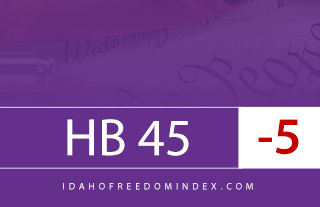


Bill Description: This bill amends numerous aspects of the regulation process for dietitians in the Idaho Code.
Rating: -5
Does it give government any new, additional, or expanded power to prohibit, restrict, or regulate activities in the free market? Conversely, does it eliminate or reduce government intervention in the market?
This legislation would in multiple ways further regulate in the practice of dietetics in Idaho. First, the bill would would add a list of what a dietician may or may not do to the new section of 54-3502A of the Idaho Code. This in addition to the scope of what a dietitian might already be allowed to do by their employer or the group under which they practice. Limiting the scope of what dieticians may do hinders the practice of their profession. (-1) Second, this bill would create more opportunity for licenses to be revoked. The threat of revocation would further restrict dieticians from performing their work effectively. (-1) Third, while dietitians must have a dietetics education, the bill would require the education come from an institution approved by the Accreditation Council for Education in Nutrition and Dietetics. This will create a more difficult process for student and education institution. (-1)
The bill succeeds in giving the Board discretion to allow some individuals a biennial renewal of their licenses, although this is not guaranteed under the provisions. (+1)
Does it increase barriers to entry into the market? Examples include occupational licensure, the minimum wage, and restrictions on home businesses. Conversely, does it remove barriers to entry into the market?
This bill makes it harder for licensed dietitians moving to Idaho to get their licenses here. Under 54-3508, Idaho Code, individuals only have to be registered by the national commission and licensed by another state. The new addition will require individuals to document their never having been disciplined. Regardless of the resolution of a disciplinary action elsewhere, the bill precludes them from getting an Idaho license. (-1)
Does it directly or indirectly create or increase penalties for victimless crimes or non-restorative penalties for non- violent crimes? Conversely, does it eliminate or decrease penalties for victimless crimes or non-restorative penalties for non-violent crimes?
This bill punishes individuals for actions largely unrelated to their practice of dietetics. The punishments are not proper for crimes that may have been committed. The bill includes a new provision that if an individual “Has been convicted of or pled guilty to driving under the influence of alcohol, drugs or other intoxicating substances, or has been convicted of or pled guilty to other drug or alcohol-related criminal charges,” the individual can be disciplined by the board. These offenses do not pertain to the individual's practice of dietetics. Punishment by the board is excessive and not relevant to the offenses. (-1)
This bill also adds a new section, 53-3510A, Idaho Code, including a slew of additional disciplinary procedures. In addition to the restriction or revocation of licenses, this new section allows for fines of up to $1,000 for every offense. These sanctions are not reparative or restorative, only punitive. (-1)


